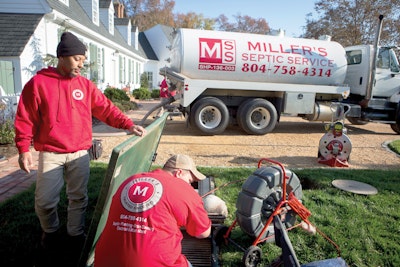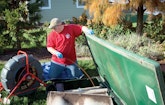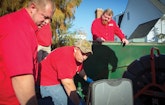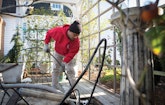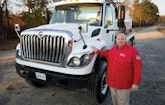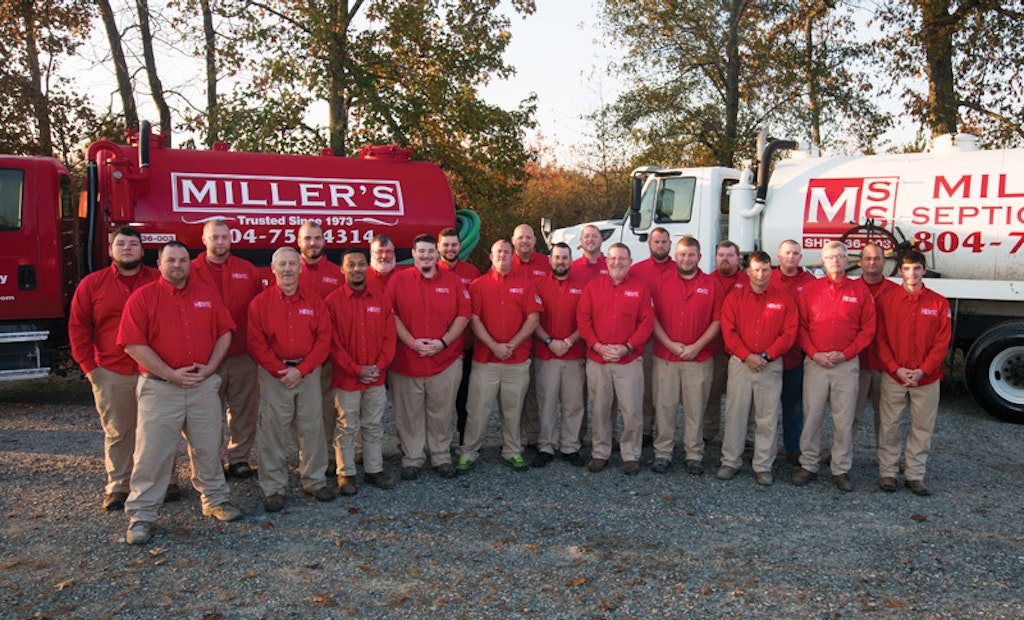Interested in Inspection?
Get Inspection articles, news and videos right in your inbox! Sign up now.
Inspection + Get AlertsJamie Miller, vice president of Miller’s Septic Service, has set high standards and lofty goals for the company his grandparents formed in 1973. He is also reshaping the culture and management style of the Gloucester County, Virginia-based company in order to perform at a higher level, expand the customer base, and take care of their employees.
Located in the historical area around Jamestown, Richmond and Williamsburg, Miller’s Septic Service serves a mix of rural and urban homes, some on septic systems and some on city sewers. The customer base is heavily residential, and while commercial work represents only 25 percent of the client base, it makes up a larger portion of revenue.
The company does a lot of work for the College of William and Mary, and the military, as the Army, Navy, Air Force, Marine Corps and Coast Guard all have major facilities in the area. Miller says they cover about half the state, including the Northern Neck, Middle Peninsula, Virginia Peninsula, the Southside of Hampton Roads area of and all around the surrounding region of Richmond. They travel a radius of about 75 miles.
The area is among the oldest in the country, and historic structures stand next to newer developments, with everything from Orangeburg and terra-cotta pipes to cast iron and asbestos cement in the ground. Infiltration problems are common, and they frequently find bad joints and broken pipes, particularly in those older systems. Roots are another regular problem, thanks to the abundance of maple and weeping willow trees in the region.
Gearing up
“The year 2002 was an interesting time in our business,” says Miller, who came on board full time in 1999. “I was able to buy into the company from my grandmother, Udell Miller, and we formed the company as a corporation. We began looking at new technologies and recognizing the opportunities for growth, which allowed us to expand on drain cleaning and grow the plumbing services.
“We had a jetter installed on one of our pump trucks, which was an immediate plus for us. Prior to this we had snaked sewer lines and did some minor flushing, and snaked drains inside the house.”
The company is currently running a 2000 Vac-Con on an International chassis with a three-stage blower. They also have a Spartan trailer jetter that produces 3,000 psi/15 gpm. Two of their three pump trucks now have jetters, which are essential for both drain cleaning and septic work.
In addition to the Vac-Con and the three pump trucks, Miller’s runs 10 service vans, primarily Chevrolet and GMC. Miller says they usually get over 200,000 miles on service vans, and he has one in service with over 300,000 miles that’s still running very well.
For excavation they have a Kubota and a John Deere 120.
“We have a small jetter on one pump truck from Abernethy, and we have a pump truck by Lely with their jetter,” he adds.
“Jetting gives so much more capability for cleaning drains,” he says. “You’re not just clearing the line with a snake; with the jetter you clean the line. We also have the capability to pressure wash and clean the drainfields. When we are asked to camera a line we want to clean it first. Running a snake through, whether a push or electric snake, does not really clean and you won’t get a good picture of the problem when you use the camera.”
The company does a small amount of work in larger sewers, but usually they sub out larger inspection projects.
For residential and small commercial work, the Miller’s crew relies on RIDGID SeeSnake cameras. The customer base is familiar with the concept of CCTV inspection and typically understands when there is an additional charge for putting a camera in the line or jetting. The camera is essential for inspecting lateral lines and finding tanks. Additional charges depend on the conditions and issues on each job.
The company does dig-and-replace sewer line work, and when pipe bursting or relining are called for they act as a general contractor and sub the specialty work out. They also install septic systems.
When it comes to pipe bursting and relining, Miller is content to continue subcontracting that work because he doesn’t want to blur the company’s focus. He wants to concentrate on sewer and drain cleaning, and grow more into plumbing and electrical, as well as HVAC.
“I want to be a full home service company,” he says. “I see pipe bursting and relining as more specialty and an area that would require a lot of attention. I don’t see it as a profit center. Plus, we have companies nearby who specialize in those technologies, and do not offer any of the basic services we provide. Additionally, we are able to come in and do some of the excavation and plumbing work on certain jobs. In those situations we will work on occasion for that contractor.
However, we typically retain our customer and act as a general contractor. It all depends on the job and arrangement.”
Some of their drain cleaning vans carry plumbing equipment and tools. Miller wants to up that level of inventory as they move forward, but sewer, drain cleaning and septic work still create the biggest demand on a daily basis.
He plans on expanding the plumbing part of the business, which now represents approximately 25 percent of revenue. At this point in time they offer a full service list including installation of new faucets, showers, toilets, water heaters, and other service work as they evolve and expand.
“Outfitting for plumbing is something we need to improve,” he says, adding that they have a warehouse and can also access wholesalers for any supplies or equipment they need.
A higher goal
Miller says the company weathered the recession fairly well. The company actually grew over that period but stopped spending money on major purchases unless it was essential.
With all that in the rearview, Miller has set his sights on growing the company into a multimillion-dollar firm providing a full menu of services, from sewer and drain cleaning and repair, to plumbing, HVAC, electrical, septic and general contracting.
The company currently has 30 employees, with 20 technicians working in the field. In most cases, the technicians specialize but can cross over if the workload dictates.
“My pump truck drivers will do drain cleaning, and our plumbers will do drain cleaning, and some can do electrical,” Miller says. “Because we are so diversified we need to be able to move them around as required. Some of our installation guys can do service work on occasion.”
In the hiring process they do the standard drug and background checking, and Miller believes they have learned how to recruit and hire more successfully.
“One industry comment says you ‘hire slow and fire fast.’ I’m not saying we always act that way, but it is something we are starting to do more,” he says. Training is primarily in the field, and will be from 60 days up to six months working with one of their more experienced technicians, depending on the candidate. They take into consideration the experience and capability of the new hire.
Sometimes the candidate will be hired for a specific portion of the work, but they will sometimes find more talent in a different area that may be better for the technician and the company.
Shifting gears
Miller says he is re-evaluating their company culture and would like to give his technicians more authority in the field to make those on-the-spot determinations.
“Early on I think it was probably a failure of mine because I didn’t give enough authority,” he admits. “Now we are working on that point. We are doing up-front pricing, which gives the tech in the field the authority to make more decisions on the work site. We are going to support them, but not micromanage.
“We are putting in place a better way to let our technicians know how they are doing. Not with a formal review but with a scorecard for each employee where we can highlight what is expected and how that individual is performing in their areas of expertise. It will give a different kind of job description with some key performance indicators. This is something just coming together for us. Still in the planning stage.”
Miller says that he is evolving as a leader and owner.
“Two years ago I would have described myself as a dictator,” he says. “With experience I believe I have become a better leader, and that fits into my vision of growing the company.
“I have come to the conclusion that you don’t have to be so heavy-handed, and that will in the end give the individual employee more confidence in their ability and themselves.”
A life of service
As the third generation of the James Miller family, Jamie Miller has the challenge of maintaining the company’s image and reputation while staying open to change and growth to meet a modern-day business climate and culture.
After working in Miller’s Septic Service for years as a youngster, and joining full time in 1999, Miller developed a vision of growth, and he has been determined to stay on subject and develop a true profit center, while relying on subcontractors for certain services that fall outside the company’s focus.
After 16 years striving for his goals, Miller is finding day-to-day satisfaction in being able to help people who are having difficulty.
“It’s good to make money,” he says. “Everyone wants that. But I want us to contribute to the livelihood of our employees. I have come to realize and understand that the reason I was put on earth was to serve my family, my employees and customers, but it has taken a while to figure this out. I’ve spent a lot of time in these last two years soul searching what I’m here to do and it is to help people.”
Miller has been talking regularly with a mentor and in a group to reach a better understanding of who he is and what he wants to accomplish. His vision is to grow the company to a $50 million firm, providing a full stable of services that can meet the customers’ every need.
“This is to provide more than just a job for my employees,” he says. “I want to build a way for them and their families to get ahead in this life and provide that higher level of service for the customers. We want those customers to love us for what we do for them.”
